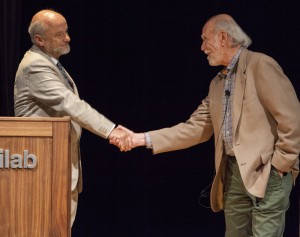
Pier Oddone (then ICFA chair) and Barry Barish shaking hands over the handover of the Technical Design Report in June. Image: Fermilab
The discovery of the Higgs boson at the LHC in the last year has clarified the initial scientific objective of the Linear Collider projects. It tell us that a Higgs factory will be the first phase of the Linear Collider project. This changes the formerly mutually exclusive situation of the ILC and CLIC projects into peaceful coexistence. The two projects may proceed one after the other, depending on the science and resources in the future. Therefore, in February the International Committee for Future Accelerators (ICFA) smoothly combined the ILC and CLIC projects together to form an unified organisation of LCC (Linear Collider Collaboration) which is now led by Lyn Evans. The International Linear Collider Steering Committee (ILCSC) has also transformed to LCB, the Linear Collider Board.
In the year 2013, we have seen a lot of progress in the LC projects. At the end of 2012, the Global Design Effort (GDE) completed the ILC Technical Design Report (TDR) and the detector groups integrated their Detailed Baseline Design (DBD). Both documents went through the review processes, and they were published in June. We had a celebration for the publication of the TDR on the “ILC Day” of 12 June, passing the ceremony from Tokyo, via Geneva and to Chicago.
I wish to thank the former GDE director, Barry Barish, and his team for the completion of the TDR based on their leadership, and also to thank former Research Director, Sakue Yamada, and the physics and detector groups for the completion of the DBD.
In Japan the Ministry of Education, Culture, Sports, Science and technology MEXT organised a Taskforce for ILC in February. MEXT asked the Science Council of Japan (SCJ) to evaluate the ILC, on scientific significance in the context of particle physics and in overall scientific activities, significance of hosting ILC for Japanese people and society, and status of the preparation and necessary conditions.
On 30 September the SCJ report on ILC was submitted to MEXT. SCJ appreciates the scientific significance. SCJ also recommends to set up a group including knowledgeable people outside of the project to intensively investigate within a few years towards the final judgement for Japan to be the host of the ILC project. The issues and concerns that SCJ raised are the cost of the overall project, international cost sharing scheme, human resources and management and organisation structure of the project.
All these issues have to be clarified in any case. MEXT is officially requesting from the Ministry of Finance a budget of about $0.5M as investigation budget. Although the amount is not large, it is the first official budget request for ILC. The LCC Director Lyn Evans and his team have made several travels to Japan in this year. Lyn visited Prime Minister Shinzo Abe and the Federation of Diet Members in supporting ILC to further explain the international project. In the meanwhile, in August the Kitakami granite long bedrock area was selected as the ILC site in Japan by scientists so that the LCC can start the site-dependent design of the accelerator.
The ILC project is supported by international particle physics communities. In the spring the European Strategy Group issued the final report that was approved by the CERN Council and EC. It says that Europe looks forward to discuss a possible participation. ILC was also strongly supported in the Snowmass meetings in the United States in the summer. The discussion is also continued in the P5 process. The High Energy Physics group of Asian Committee for Future Accelerators (ACFA-HEP) also supports ILC to be hosted in Japan.
The ECFA Linear Collider Worshop was held in DESY in May, and LCWS13 was held in the University of Tokyo in November. At LCWS13 Takeo Kawamura, the chair of the Federation of Diet Members of Japan, gave a speech and concluded saying “If physicists and politicians collaborate by using each other’s area of expertise, it is certain that we accelerate the realisation of the ILC project”.
The LC community in Japan including political and industrial groups are all working hard to win a positive move of the Japanese Government. In the same time, it is important to push them with clear a vision of the international community. Since the ILC is a truly international project, the whole community has to possess a common vision of the science and the project. Just waiting for a fortune may not secure the positive results.


Recent Comments